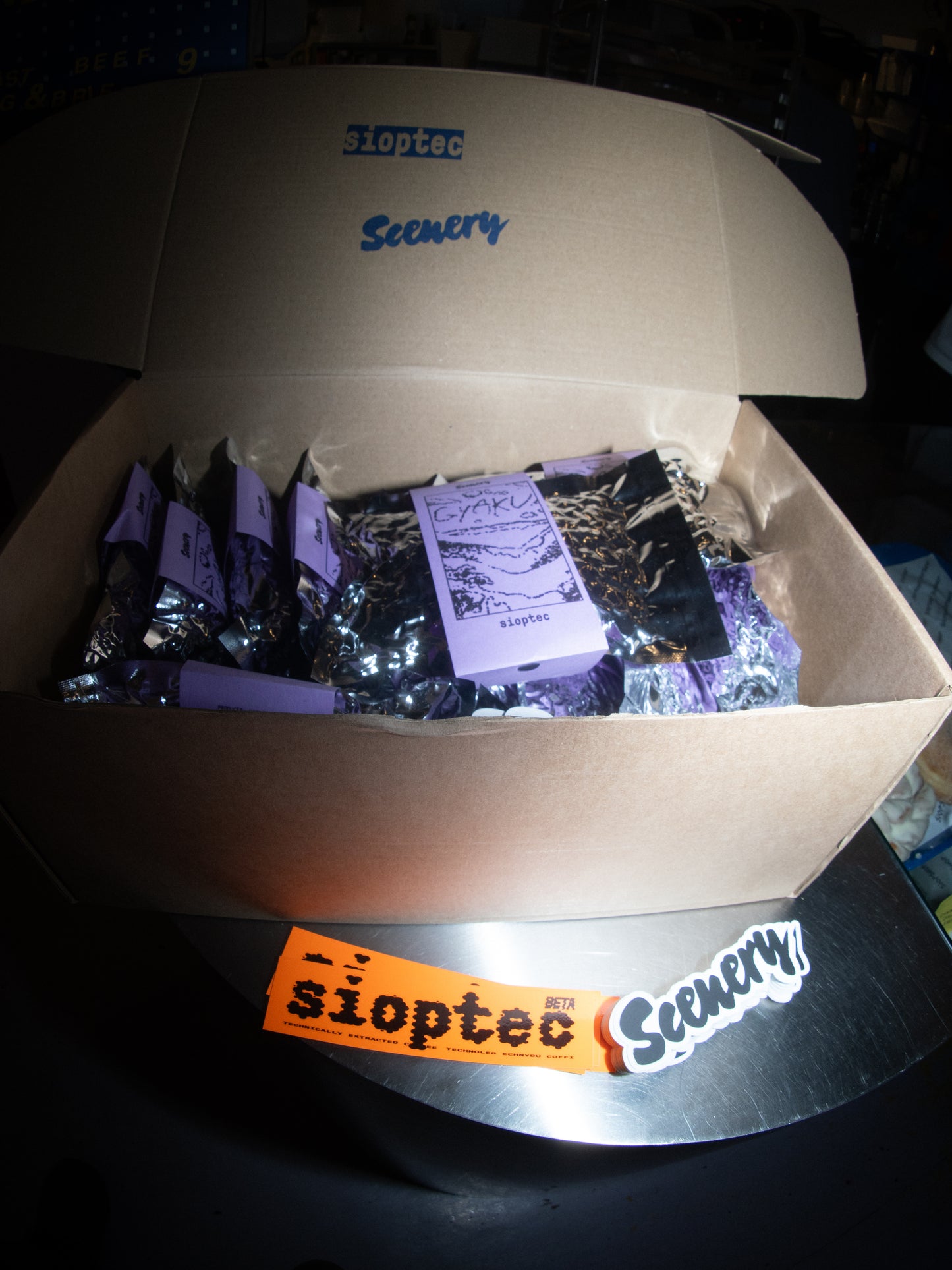







Brew Guide:
Best Brewed with: Filter
Minimal Roaster Influence: This coffee was processed with a short but intense fermentation that's left a bright, vibrant and clean cup - we've matched the processing with the roasting style, roasting extremely light with resting in mind. Maximum aromatics and acidity, minimal roaster-flavours.
Best Rested: 5 weeks+
This coffee may rest slower due to being packed in vacuum, but will be ready to brew faster once the vacuum seal is broken
Filter: 60g/L, 98°C when fresh but when well rested you can go down to 92-93°C.
Espresso: We've been dialling this on the bar at a 1:3 ratio with rapid, turbo style shots, under 20s. As espresso we're finding more florals than filter, with a zippy acidity
We’re tasting: Soft floral aromas of lady grey tea alongside apple blossom. In the cup an incredibly elegant and lively acidity - raspberry lemonade, mango juice, gooseberry, with soft white florals lingering in the finish. As it cools, becoming blackcurrant & rhubarb; with great sweetness and a silky body.
Traceability
Country of Origin: |
Panama |
Region: |
Jurutungo Region, Chiriquí |
Producer: |
Hachi Project (Bermudez, Hartmann, Antonaci) |
Farm: |
Angelica |
Variety: |
Gesha |
Elevation: |
2000-2200 MASL |
Process: |
“Inverted” Process: Whole cherries submerged in culture medium containing water, enzymes (pectinase and glucosidase), and selected yeast strains. Fermented for 24 hours, with the enzymes enabling metabolite permeation through the intact cherry. Cherries depulped and immediately washed to halt fermentation. Dried in dark room dehumidification chambers |
Import Partner: |
Purchased direct from Hachi |
Harvest |
Crop 25/26, Arrived UK October 22nd 2025 New Purchasing Relationship |
The Story
The Hachi Project emerged in 2024 as a binational venture uniting three distinct areas of expertise: Diego Bermudez's microbiology and fermentation research from Colombia, Allan Hartmann's generational coffee knowledge from Panama, and Matheus Antonaci's commercial infrastructure connecting both origins to global markets.
The Hartmann family have produced coffee in the Chiriquí highlands for over eighty years. Their farms border Parque Nacional de La Amistad, Central America's largest rainforest reserve, where volcanic soils, persistent mist, and cool nights at elevation create conditions particularly suited to Gesha cultivation. The Jurutungo area, where Finca Angelica sits, benefits from this same environmental context.
What distinguishes the Hachi Project is its philosophical position on high technical intervention. Rather than using fermentation to synthesise flavour compounds or impose a signature house style, the approach's stated intense is to "maximising the genetic expression already present in each variety" - the laboratory work, the enzyme selection, the controlled fermentation environments all serve to refine and enhance what the coffee would naturally offer, while correcting for factors that might otherwise detract from the cup.
The project itself sets out quite a deliberate (and to some, provocative) stance within ongoing debates about speciality coffee's boundaries. The project operates on the premise that scientific precision and providence-driven character need not be in opposition. Whether the industry at large accepts this position remains contested, but the commercial interest from speciality roasters globally suggests a market exists for coffees that occupy this space.
The context matters here. Research indicates that viable coffee-growing regions face significant contraction due to climate change. The Hachi Project's investments in tissue cloning, micrografting, and soil regeneration are being developed specifically with this threat in mind, developing methods that could enable quality production as traditional growing conditions shift. The premium lots we buy today fund this work, and if it can be scaled it represents a fundamental advance on the frontiers of coffee - even moreso than just heavy technical processing creating crazy results in the cup.
When considered in a vacuum, the typical "hype" that might be associated with a collab between Diego Bermudez and the Familia Hartmann might have purely been constrained to the results in the cup - ultra wild lots for the modern speciality experience. But when we consider what the project itself is setting out to achieve - and tasting a coffee like this, with incredibly soft-touch processing - we arrive at something far more nuanced and interesting. A coffee that isn't just a premium lot to be hyped, sold as a flash in the pan - but as an artefact of that larger experimental programme and indeed the hyper-object of the future of coffee itself.
As roasters and coffee buyers, we want to acknowledge the tension between ultra-premium lots like this and a buying philosophy that typically prioritises higher-impact coffees. But that tension only exists if we hold ourselves to a puritanical standard that has never been the scope of Scenery. From the start, our mission has been to buy, roast, and present coffees that we truly love - and we wanted to dabble with something so outside of our typical wheelhouse. Representing an interesting technological and process-driven twist, which is definitely inside our wheelhouse.
That technology & fidelity driven philosophy, as well as the sheer joy of tackling something very fun - that's what lead us to use this coffee in collaboration with the gang at siopTEC- we knew from the moment we proposed it was a perfect match of coffee, people and philosophy.
- Choosing a selection results in a full page refresh.
- Opens in a new window.








